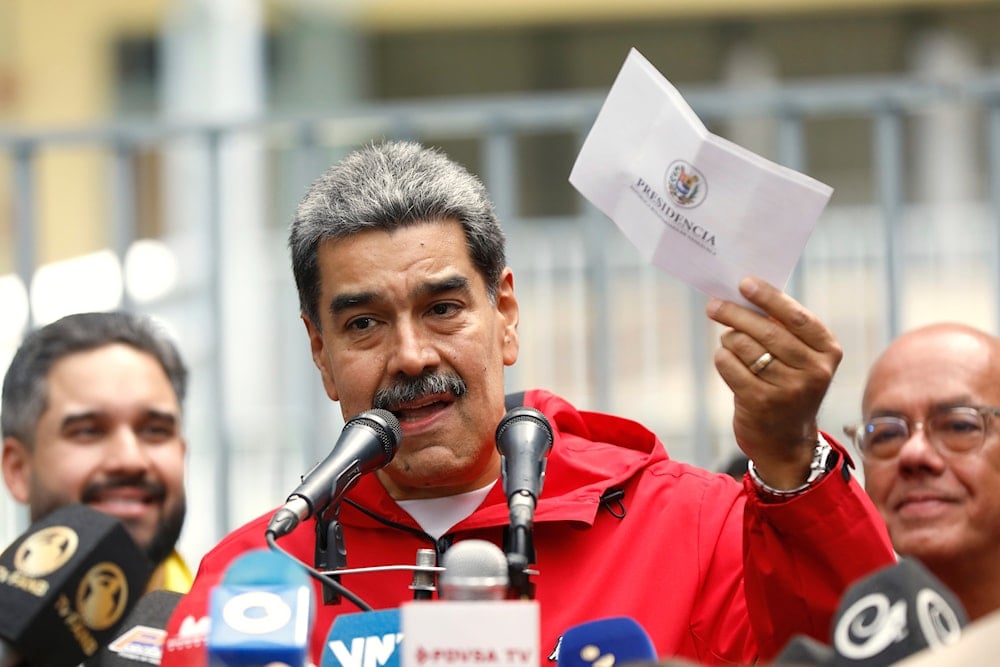Maduro’s coalition dominates Venezuela’s 2025 municipal elections
Nicolas Maduro’s ruling bloc crushes the opposition in Venezuela’s 2025 municipal elections, securing 285 out of 335 municipalities amid economic crisis and Western pressure.
-

Venezuela's President Nicolas Maduro speaks after voting in municipal elections in Caracas, Venezuela, Sunday, July 27, 2025 (AP)
Venezuela’s ruling leftist alliance, the Great Patriotic Pole Simon Bolivar (GPPSB), achieved a sweeping victory in the 2025 municipal elections, according to official results released Monday by the National Electoral Council.
Led by President Nicolas Maduro, the GPPSB coalition secured control of the vast majority of Venezuela’s municipalities, winning in 285 out of 335 local races. The results, representing over 90% of votes counted, confirmed the alliance’s dominance across state capitals such as Apure, Barinas, Aragua, Carabobo, Falcon, and Lara, as well as in the key municipalities of Caracas and Sucre.
Opposition forces, by contrast, managed victories in only two areas, Chacao and Baruta, highlighting the continuing decline in support for anti-Maduro coalitions at the local level.
“We have reinforced our irreversible victory in 285 out of 335 municipalities so far,” President Maduro said. “It is a triumph for the ordinary citizen!”
Voter participation surpasses 44% nationwide
The electoral authority reported that 304 of the 335 mayoral races had confirmed results showing a clear lead for the ruling bloc. These figures further underscore the margin by which Maduro’s political forces have extended their influence nationwide, at a time when internal divisions and lack of leadership continue to plague opposition parties.
According to the National Electoral Council, a total of 6,273,531 Venezuelans cast their ballots in the elections, accounting for 44% of the registered electorate. The vote was conducted through a non-revocable voting system, which enabled the release of highly accurate preliminary outcomes.
The council emphasized the system’s alignment with final results, suggesting electoral transparency despite international criticism and domestic skepticism over Venezuela’s broader political environment.
This latest municipal victory further consolidates the political standing of President Nicolas Maduro and his allies at a time when Venezuela remains under heavy Western sanctions and ongoing economic pressure. While the country continues to navigate a prolonged crisis, the ruling coalition’s continued dominance in electoral contests appears to reinforce its control of the national political landscape.
The outcome also reflects the enduring organizational capacity of the Great Patriotic Pole Simon Bolivar coalition, which has maintained electoral momentum despite challenges both at home and abroad.
Wider context
Polling stations across Venezuela closed on July 27, 2025, following a day of calm and orderly municipal elections. More than 21.5 million Venezuelans cast their votes to elect 335 mayors and over 2,400 municipal councilors nationwide.
In a notable addition to the electoral process, the country held its first-ever National Popular Consultation of Youth, allowing young Venezuelans to vote on over 37,000 community-based initiatives. The youth-led vote marked a new phase in participatory local governance.
Jorge Rodriguez, head of the VEN25+ Campaign and leader of the Unified Command of the Bolivarian Revolution, described the elections as potentially "the largest victory for the revolutionary movement in municipal history." He praised the strong voter turnout and hailed the youth consultation as a milestone in democratic participation.
Seven youth-backed projects chosen for development
Rodriguez highlighted the selection of seven priority projects that reflect young people’s aspirations, including programs for children with special needs and the establishment of digital learning centers. These, he said, embody “an innovative approach to grassroots democracy.”
He further lauded President Nicolas Maduro’s readiness to allocate resources toward realizing these initiatives, stating that development aligned with the people’s will “is already underway.”
Officials from the National Electoral Council (CNE) reported a smooth, incident-free voting process. International observers present during the vote verified its transparency and confirmed the legitimacy of the proceedings.
Rodriguez commended the participation of 56 political organizations and emphasized that the event unfolded without confrontation, calling it a testament to “Venezuela’s commitment to peaceful political expression.”
The campaign chief also praised the resilience of Venezuelans amid external pressures and sanctions. “Despite facing intense external aggression, [the people] continue advancing toward the restoration of a welfare state dedicated to social justice,” he said. Rodriguez credited the CNE’s professional handling of the vote as a reinforcement of “Venezuela’s electoral sovereignty.”
Defense minister condemns US spy plane flyover during elections
On election day, Venezuelan Vice President and Defense Minister Vladimir Padrino Lopez condemned the incursion of a US RC-135 reconnaissance aircraft into Venezuelan airspace, calling it a blatant violation of international norms.
“He has violated the aeronautical security system, he has violated the flight information region, which is violating aeronautical regulations,” Padrino Lopez said, pointing out that the flyover occurred while Venezuelans were casting ballots.
“They felt like doing it during elections.”
Despite the provocation, the government praised the orderly conduct of the elections and the public’s trust in the Revolutionary National Armed Forces (FANB), which oversaw national security throughout the process. Authorities highlighted the seamless implementation of the Republic Plan, even in remote regions.
These elections, officials noted, represent the conclusion of a new cycle of political transition across the country.
Response to the US senator’s remarks
Padrino Lopez also responded to recent comments by US Senator Marco Rubio, who accused President Maduro of leading the so-called “Cartel of the Suns.” The minister dismissed Rubio’s statements as an “action of imperialism trying to impose a narrative,” and voiced strong support for the Venezuelan president.
“We support our constitutional president who has been an example to the FANB and the people of Venezuela,” he said.
Padrino Lopez concluded by affirming that the armed forces would continue to “patrol all the streets and guarantee internal order and the defense of all our sovereignty,” remaining alert to “any expression of violence by gangs with political aims and destabilization of the Venezuelan State.”

 6 Min Read
6 Min Read








